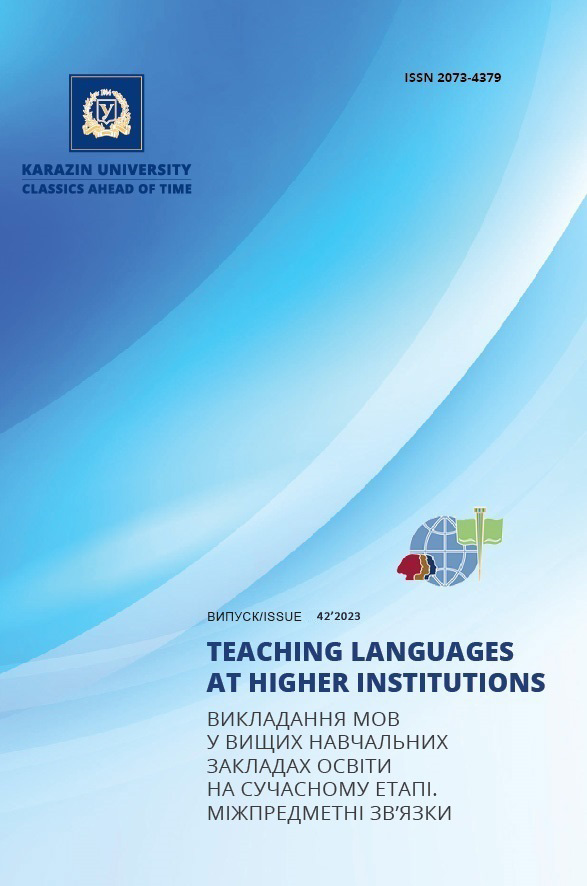Intercultural approach to foreign language learning as a factor of studentsʼ personal development in the process of foreign culture studying
Abstract
Positive intercultural interaction and positive changes aggravate cross-cultural communication problems in modern society, caused by contradictions between the values and lifestyles of different peoples. In this regard, the search for ways to transform cultural diversity as a factor hindering intercultural dialogue into a means of mutual understanding and enrichment, into a tool for the development of a socially active and independent personality, capable of being a full-fledged participant in the dialogue of cultures, is becoming more relevant in education. The purpose of the article is to compare the functions of speech activity and culture and show their close relationship; to demonstrate that the methodological meaning of this unity is that speech acts cannot be learned in isolation from culture, and intercultural learning is not just interaction with another culture, but the cultural development of the learner; to consider the intercultural approach peculiarity in learning a foreign language through cognition, evaluation, and comparison of the native culture with the culture of the nation whose language is studied. The research methodology consists of theoretical analysis and generalization of scientific and methodological literature, which considers the basic principles, concepts, approaches to culture, and universal and cultural features in teaching foreign languages; synthesis of modern theoristsʼ views, to demonstrate the importance of the intercultural approach in language learning and personality development. The authors consider the process of joint learning of language and culture, which involves not only the formation of intercultural competence as one of the results of language learning but also the acquisition of a linguistic and cultural picture of the world as the content of this process, as well as the formation of other competencies, abilities, and qualities of a multilingual, multicultural personality. The process of learning a foreign language can be seen as a unique potential for personal development. It is not only about the development of intellectual qualities that allow one to penetrate the mental space of people of a foreign culture and overcome their cultural isolation, but also about the rooting of value and semantic orientations that contribute to the successful self-realization of modern youth as cultural subjects in a multicultural space.
Downloads
References
Atay, D., Gokce, Kurt, G., Çamlibel, Z., Ersin, P., Kaşlıoğlu, Ö. (2009). The Role of Intercultural Competence in Foreign Language Teaching. İnönü Üniversitesi Eğitim Fakültesi Dergisi. 10 (3), pp. 123–135. Available at: https://www.researchgate.net/publication/239606285_The_ Role_of_Intercultural_Competence_in_Foreign_Language_Teaching [Accessed 12 Dec. 2022].
Brahim Mohamed GEDEIR. (2021). Culture Teaching in Foreign Language Education: Theoretical Foundations and Pedagogical Implications. Ex PROFESSO. 6, pp. 44–53. Available at: https://www.researchgate.net/publication/359257248_Culture_teaching_in_foreign_language_education_theoretical_foundations_and_pedagogical_I_Implications_Brahim_Mohamed_GEDEIR_Culture_Teaching_in_Foreign_Language_Education_Theoretical_Foundations_and_P [Accessed 12 Dec. 2022].
Bo Jiang, Li Liu, Ziwei Guo, Yufei Wang. (2022). A Study of Intercultural Communicative Competence in ELT. Advances in Journalism and Communication. 10, 3, pp. 297–306. DOI: https://doi.org/10.4236/ajc.2022.103018.
Chornous, V. (2022). The problem of intercultural communication in teaching a foreign language in a professional orientation. Academic Journal of the National Pedagogical Dragomanov University. 87, pp. 103–107. Available at: http://enpuir.npu.edu.ua/handle/123456789/38068 [Accessed 12 Dec. 2022].
Council of Europe. (2020). Common European Framework of Reference for Languages: Learning, teaching, assessment – Companion volume. Council of Europe Publishing, Strasbourg. Available at: www.coe.int/lang-cefr [Accessed 12 Dec. 2022].
Deardorff, D.K. (2006). Identification and Assessment of Intercultural Competence as a Student Outcome of Internationalization. Journal of Studies in International Education. 10, pp. 241–266. DOI: https://doi.org/10.1177/1028315306287002.
Drobot, I. (2021). Multilingualism and Awareness of Cultural Differences in Communication. Multilingualism – Interdisciplinary Topics. IntechOpen. DOI: https://doi.org/10.5772/intechopen.99178.
Hinkel, E. (1999). Culture in Second Language Teaching and Learning. Cambridge, UK: Cambridge Applied Linguistic. Available at: http://www.elihinkel.org/downloads/CultureInL2Learning.pdf [Accessed 12 Dec. 2022].
Holubnycha, L., Kostikova, I.I., Leiba, O., Lobzova, S., Chornovol-Tkachenko, R. (2019). Developing Studentsʼ Intercultural Competence at the Tertiary Level. Revista Romaneasca pentru Educatie Multidimensionala. 11 (3), pp. 245–262. DOI: https://doi.org/10.18662/rrem/149.
Kovács, G. (2017). Culture in Language Teaching. Acta Universitatis Sapientiae, Philologica. 9, 3, pp. 73–86. DOI: https://doi.org/10.1515/ausp-2017-0030.
Liddicoat Anthony J. (2020). Teaching languages from an intercultural perspective. Rethinking Languages Education. DOI: https://doi.org/10.4324/9781315107974-13.
Llull, J., Palacios, A., Ulkuniemi, S. (2018). Fostering Intercultural Competence Through Art and ICT Among University Students in Spain and Finland. Cross-Cultural Perspectives on Technology-Enhanced Language Learning. IGI Global Platform, p. 26. Available at: https://www.igi-global.com/gateway/chapter/206106 [Accessed 12 Dec. 2022].
Moeller, A.J., Nugent, K. (2014). Building intercultural competence in the language classroom. Dhonau S. (Ed.). Unlock the Gateway to Communication. Eau Clarie, W.I.: Crown Prints, pp. 1–18. Available at: https://digitalcommons.unl.edu/cgi/viewcontent.cgi?article=1160&context=teachlearnfacpub [Accessed 12 Dec. 2022].
Obilişteanu, G., Niculescu, B. (2018). Intercultural Competence in Teaching and Learning Foreign Languages. International conference KNOWLEDGE-BASED ORGANIZATION, 24 (2), pp. 345–350. DOI: https://doi.org/10.1515/kbo-2018-0113.
Reid, Eva. (2010). Culture – an inevitable part of a foreign language teaching Modernization of Teaching Foreign Languages: CLIL, Inclusive and Intercultural Education Edition: 1. Publisher: Brno: Masarykova univerzita. Available at: https://www.researchgate.net/publication/ 262673666_ Culture_-_an_inevitable_part_of_a_ foreign_language_ teaching [Accessed 12 Dec. 2022].
Sorkos, G., Hajisoteriou, C. (2021). Sustainable intercultural and inclusive education: teachersʼ efforts on promoting a combining paradigm. Pedagogy, Culture & Society, 29: 4, pp. 517–536. DOI: https://doi.org/10.4304/tpls.3.2.371-37510.1080/14681366.2020.1765193.
Sun, L. (2013). Culture Teaching in Foreign Language Teaching. Theory and Practice in Language Studies, 3 (2), pp. 371–375. DOI: https://doi.org/10.4304/tpls.3.2.371-375.

